Feb. 29, 2024
Thesaurus : Doctrine

► Full Reference: B. Fiorini, "Approche doctrinale de l’enquête interne et de l’enquête pénale privée" ("Doctrinal approach to internal investigations and private criminal investigations"), in M.-A. Frison-Roche & M. Boissavy (eds.), Compliance et droits de la défense. Enquête interne – CJIP – CRPC, Journal of Regulation & Compliance (JoRC) and Dalloz, coll. "Régulations & Compliance", 2024, pp. 63-68
____
📕read a general presentation of the book, Compliance et droits de la défense. Enquête interne – CJIP – CRPC, in which this article is published
____
► English Summary of the article (done by the Journal of Regulation & Compliance - JoRC): The author sets out the two profoundly distinct, even opposing, cultures of inquisitorial and adversarial repressive procedural systems. The former gives confidence and power to public officials to find the truth, while the latter gives confidence and power to the opposing parties in the dispute. Private investigations naturally develop in the second system and not in the first.
This second system of thought is rooted in the United States, which naturally welcomes internal investigations carried out by companies and associates procedural principles such as the rights of the defence, adversarial proceedings and the right to a lawyer. The first system, characteristic of Continental Law systems, is resistant to the very idea of a private criminal investigation. This is why, when the internal investigation mechanism develops within a company, the procedural mechanisms mentioned above are less naturally associated with it.
____
🦉This article is available in full text to those registered for Professor Marie-Anne Frison-Roche's courses
________
Feb. 26, 2024
Hearings by a Committee or Public organisation
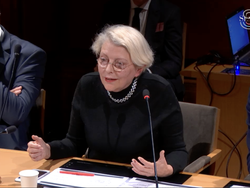
🌐suivre Marie-Anne Frison-Roche sur LinkedIn
🌐s'abonner à la Newsletter MAFR Regulation, Compliance, Law
____

► Référence complète : M.-A. Frison-Roche, "Le juge dans les contentieux de vigilance", participation à la "table ronde sur le devoir de vigilance", audition par la Commission d'enquête du Sénat sur les moyens mobilisés et mobilisables par l'État pour assurer la prise en compte et le respect par le groupe TotalEnergies des obligations climatiques et des orientations de la politique étrangère de la France, 26 février 2024, 16h-17h30
____
____
📺regarder en différé l'ensemble de la table ronde
____
📓lire le rapport de la commission d'enquête du Sénat
____
⚖️ Cette audition a été menée en considération de règles spécifiques à ma situation dans la mesure où d'une part le Droit interdit sous peine de sanction pénale à la personne convoquée de refuser de se présenter et ou d'autre part j'ai immédiatement rappelé au secrétariat de la Commission d'Enquête qu'ayant été Amica Curiae dans le litige opposant les associations Les Amis de la Terre et autres en demande et le groupe TotalEnergie en défense, l'objet du litige portant sur des manquements allégués d'obligations découlant de devoir de vigilance, le statut d'Amica Curiae a conduit pendant cette instance à ne pas connaître le dossier et à continuer de ne pas le connaître pendant une période raisonnable après l'audience du 26 octobre 2022 et le jugement du 28 février 2024 dans le cas dit "Total Ouganda", ce qui conduit nécessairement par application aux règles juridiques et de déontologie à ne pas répondre à certaines questions.
Dans le respect de ces contraintes, il est répondu le mieux possible pour éclairer la Commission d'Enquête.
Cette audition est à mettre en corrélation avec l'audition qui s'est déroulée devant la Commission ... de l'Assemblée Nationale ....
____
► Organisation de la Table Ronde : En accord avec le secrétariat de la Commission d'Enquête, et afin de rendre le plus fructueux possible le premier temps de cette table ronde ayant pour objet Le devoir de vigilance, dans la mesure où il apparaît que dans l'ensemble des auditions programmées, c'est sans doute là où se concentre le plus l'expertise juridique, les 4 intervenants se sont préalablement réunis pour éviter le double écueil soit de traiter deux fois la même chose soit de laisse une dimension du sujet non traité.
Ainsi la première intervenante traite de la façon dont les entreprises élaborent les plans de vigilance, le deuxième intervenant développe la façon dont elles intègrent leur devoir de vigilance dans leur déploiement international, notamment par des mécanismes contractuels, le troisième intervenant expose ce que, dans les contentieux, les demandeurs (qui sont souvent des ONG) allèguent, ce qui m'a conduit en dernier lieu à exposer ce qu'il en est de l'office du juge en la matière.
Il en résulte que mon intervention de 8 minutes aborde plus particulièrement de la question de l'office du juge dans la mise en application du devoir de vigilance.
____
🔲consulter les slides servant de support à cette intervention
____
► Présentation de l'intervention préliminaire : En premier lieu, j'ai souligné qu'en l'état du droit positif, le droit français repose sur le juge puisque la loi pose une Obligation de Vigilance, qui est à la fois une obligation générale et de moyens, l'entreprise devant montrer qu'elle fait ses "meilleurs efforts", cette obligation générale, qui n'est pas limitée à l'environnement, étant déclinée d'une façon particulière par l'entreprise en fonction de ses risques particuliers et de ses engagements propres, notamment contractuels, tandis que le juge applique ce système au cas par cas.
La loi de 2017 a voulu confier ce pouvoir au juge et a voulu un système simple en donnant la seule compétence au seul Tribunal Judiciaire de Paris, ce qui permet d'obtenir une interprétation jurisprudentielle, aussi bien sur les questions procédurales et substantielles, immédiatement unifiée, le dialogue des juges devant être toujours favorisé, tandis que la spécialisation et la formation de ces juges étant un enjeu auquel les juridictions ont répondu concrètement, la Cour d'appel de Paris ayant mis en place une chambre spécialisée, tandis qu'une formation spécialisée sur ces "contentieux systémiques émergents" d'un type nouveau se met en place. Cette spécialisation rend moins impérieuse l'établissement d'une Autorité administrative de supervision.
Cette présence du juge ne doit pas être présentée ni perçue comme pathologique car le procès de vigilance est dans l'ordre des choses, les parties prenantes trouvant une voie d'expression : d'une part plus les entreprises développeront en amont le dialogue et moins il y aura de contentieux et d'autre part le procès lui-même, en continuum, doit favoriser ce dialogue, par le contradictoire et par la médiation.. C'est une part essentielle de l'office du juge qui doit aussi faire respecter le Droit et apporter des solutions à ces enjeux systémiques, la remédiation (plutôt que trancher et sanctionner) étant une voie de son office à développer.
Parce que les juridictions concernées ont su ajuster leur organisation interne et les juges adapter leur office, la généralité de la loi de 2017 permettant précisément cela, la question de l'adoption ou de la non-adoption de la directive CS3D n'étant de ce fait pas un enjeu dramatique parce que le juge est déjà au centre de la vigilance, il convient plutôt de laisser le temps que l'oeuvre de jurisprudence se fasse.
________

Feb. 19, 2024
Publications

🌐 follow Marie-Anne Frison-Roche on LinkedIn
🌐subscribe to the Newsletter MAFR Regulation, Compliance, Law
____
 ► Full Reference: M.-A. Frison-Roche, Compliance and conformity: distinguishing them to articulate them, Working Paper, February 2024.
► Full Reference: M.-A. Frison-Roche, Compliance and conformity: distinguishing them to articulate them, Working Paper, February 2024.
____
📝 this working paper was drawn up to serve as a basis for the article published in French in the Chronique MAFR - Compliance Law, published in the Recueil Dalloz.
____
► Summary of this Working Paper: The words "conformité" and "compliance" are sometimes used interchangeably, presenting "conformité" as the translation into good legal French vocabulary of "compliance", which would come from the American system. This is not true, however, because each of these terms refers to two distinct and even opposing concepts.
"conformity"' would require companies to show that they are actively obeying all the 'regulations' applicable to them, regardless of their content. "Compliance Law" is a new substantial branch of Law that derives its normativity from the "Monumental Goals" targeted by the political and public authorities: these monumental goals are intended to ensure that systems do not collapse in the future (Negative Monumental Goals), or even improve (Positive Monumental Goals). The systems concerned are banking, finance, energy, health, transport, digital and climate systems. The scope of Compliance Law is therefore both much more limited and more ambitious.
Distinguishing between the two allows us to put conformity back where it belongs, as a tool of Compliance Law. As such, conformity justifies the collation and correlation of information, with the algorithmic system playing a major role in this. On the other hand, the human concern that underpins Compliance Law justifies making training and the actions of in-house lawyers, attorneys and judges, central to it. The evidentiary system of Compliance that is currently being developed is based on evidentiary techniques rooted on the one hand in the tool of conformity and on the other in the culture of Compliance, which can be articulated as soon as they are no longer confused.
____
🔓read the working paper below⤵️
Feb. 15, 2024
Publications

🌐follow Marie-Anne Frison-Roche on LinkedIn
🌐subscribe to the Newsletter MAFR Regulation, Compliance, Law
____
► Full Reference: M.-A. Frison-Roche, "Adjusting General Procedural Law to Compliance Law by the Nature of things", in M.-A. Frison-Roche (ed.), Compliance Jurisdictionalisation, Journal of Regulation & Compliance (JoRC) and Bruylant, "Compliance & Regulation" Serie, 2024, pp. 273-28.
____
📝read the article
____
🚧read the bilingual Working Paper which is the basis of this article, with additional developments, technical references and hyperlinks
____
📘read a general presentation of the book, Compliance Jurisdictionalisation, in which this article is published
____
The principal elements of this articles had been presented during the scientific manifestation held on September 23, 2021, at Dauphine University in Paris, coorganised by the Journal of Regulation & Compliance (JoRC) and the Institute Droit Dauphine.
In the book this article is placed in the chapter II about the General Procedural Law in the Compliance Law.
____
► Summary of the article (done by the Journal of regulation & Compliance - JoRC): General Procedural Law is an invention, essentially due to Professor Motulsky, going well beyond the gain that one always has in comparing types of procedures with each other. As he asserted, there is Natural Law in General Procedural Law, in that as soon as there is the Rule of Law Principle there cannot be, whatever the "procedure", even the "process", such and such way of doing things: for example, to decide, to seize the one who decides, to listen before deciding, to contest the one who has decided.
General Procedural Law therefore depends on the nature of things. However, Compliance Law organizes things in a new way. Therefore, both the simple and iron principles of General Procedural Law creep in where we do not expect them at first sight, because there is no judge, this character around whom ordinary procedures fit together. The principles of General Procedural Law are essential in companies. Even if the regulations do not breathe a word about it, it is up to the Judges, in particular the Supreme Courts, to recognize this nature of things because on this effect of nature that General Procedural Law is built: when compliance mechanisms oblige companies to strike, General Procedural law must oblige, even in the silence of the texts, to arm those who can be hit, even stand up against devices that would set aside too much these defenses that are easily considered contrary to efficiency (I).
But because it is a question of making room for this nature of the things of which the Rule of Law Principle entrusts the custody to the Judge and the Lawyer, the General Procedural Law must also adjust itself to what the extraordinary new branch of Law Compliance Law is. Indeed, Compliance Law is extraordinary in that it expresses the political pretention to act now so that the future will not be catastrophic, by detecting and preventing the realization of systemic risks, or even that it is better, by building effective equality or real concern for others. Because it is the Monumental Goals that defines this new branch of Law, a disputed systemic issue, possibly disputed by several parties before a judge, the procedural principles used by the court must be broadened considerably: they must then include civil society and the future (II).
General Procedural Law thus naturally acquires an even more place than in the classic branches of Law since on the one hand it imposes itself outside of trials, particularly in companies and on the other before the courts it involves people who had hardly any place to speak and thinks themselves, especially the systems entering the "causes" of Compliance now debated before the Judge.
________
Feb. 9, 2024
Conferences
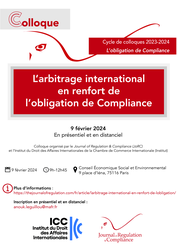
🌐follow Marie-Anne Frison-Roche on LinkedIn
🌐subscribe to the Newsletter MAFR Regulation, Compliance, Law
____
► Full Reference: M.-A. Frison-Roche, "Préalable : ce qu'est un engagement" ("Prerequisite: the Commitment"), in L. Aynès, M.-A. Frison-Roche, J.-B. Racine and E. Silva-Romero (dir.), L'arbitrage international en renfort de l'obligation de Compliance (International Arbitration in support of the Compliance Obligation), Journal of Regulation & Compliance (JoRC) and Institute of World Business Law of the ICC (Institute), Conseil Économique Social et Environnemental (CESE), Paris, February 9, 2024
____
🧮see the full programme of this event
____
🌐consult on LinkedIn a general presentation of this event, which links to a presentation of each speech (in French)
____
____
🔲see the slides used to support the presentation (in French)
____
🎤see a presentation of the conference "Préalable : ce qu'est l'Obligation de Compliance" ("Prerequisite: what is the Compliance Obligation"), given at the same symposium
____
🎤see a presentation of the conference "Le renforcement des engagements de Compliance par le renvoi Ex Ante à l'arbitrage international" ("Reinforcing Compliance commitments by referring Ex Ante to International Arbitration") which was finally not pronounced but will be the subject of an 📝article in the forthcoming book 📘Compliance Obligation
____
► Presentation of the conference: Having defined the Compliance Obligation in "Préalable : ce qu'est l'Obligation de Compliance" ("Prerequisite: what is the Compliance Obligation"), I set out to define what a commitment is.
No one doubts that commitments, as words, constitute facts that can engage the liability of companies if there are inconsistencies or lies. The question today is whether a commitment can constitute a legal act, binding in ex ante.
Companies make commitments either to fulfil their legal Compliance obligations, which is simply obeying the law, or to express their own wishes, either for themselves or for others. The cases are often confused, even though the scope is not the same.
If the commitment takes the form of a contract, Compliance is concerned if the contract is used as an Ex Ante Compliance Tool📎
The commitment, a concept that comes more from the Economics of Regulation, was conceived between a Regulatory Authority and a Company: it is the unilateral decision of the Authority that gives legal force to the commitment. Case law confirms this (Conseil d'État (French Council of State)📎
If commitment is central to Compliance, particularly Vigilance, it is because Compliance Law is an extension of Regulatory Law📎
In drawing up a plan, the company is fulfilling its legal obligation. But if we were to consider that it is a commitment, then we would also have to consider that the plan is the result of its will, that it must consult the stakeholders in its preparation, but that the source of the plan is its will: the provisions are not stipulations, are not applications of the law, but unilateral voluntary provisions.
In this respect, and because its source is the will of the company (which does not prevent its co-construction), a plan could contain a "graduated offer" of arbitration.
This offer could be included in commitments that are less regulated by law, such as those made in the context of CSR.
________
🕴️M.-A. Frison-Roche (ed.), 📘Compliance Tools, 2021.
Feb. 9, 2024
Conferences

🌐follow Marie-Anne Frison-Roche on LinkedIn
🌐subscribe to the Newsletter MAFR Regulation, Compliance, Law
____
► Full Reference: M.-A. Frison-Roche, "Préalable : ce qu'est l'obligation de Compliance" ("Prerequisite: the Compliance Obligation"), in L. Aynès, M.-A. Frison-Roche, J.-B. Racine and E. Silva-Romero (dir.), L'arbitrage international en renfort de l'obligation de Compliance (International Arbitration in support of the Compliance Obligation), Journal of Regulation & Compliance (JoRC) and Institute of World Business Law of the ICC (Institute), Conseil Économique Social et Environnemental (CESE), Paris, February 9, 2024
____
🧮see the full programme of this event
____
🌐consult on LinkedIn a general presentation of this event, which links to a presentation of each speech (in French)
____
____
🔲see the slides used to support the presentation (in French)
____
🎤see a presentation of the conference "Préalable : ce qu'est un engagement" ("Prerequisite: the Commitment"), given at the same symposium
____
🎤see a presentation of the conference "Le renforcement des engagements de Compliance par le renvoi Ex Ante à l'arbitrage international" ("Reinforcing Compliance commitments by referring Ex Ante to International Arbitration") which was finally not pronounced but will be the subject of an 📝article in the forthcoming book 📘Compliance Obligation
____
► Presentation of the conference: I have first dealt with the very definition of the Compliance Obligation.
After showing that the relationship between Compliance Law and International Arbitration will naturally develop, because the companies subject to it are international, because they contractualise their legal Compliance obligations and because Compliance is being jurisdictionalised📎
This culture of compliance is achieved either through compliance contracts📎
The obligation of Compliance which then takes concrete form consists for the company not in making effective Ex Ante all the regulations which apply to it (conception of conformity which is at once unreasonable, blind and impossible), but in making its best efforts, which it must make visible (see Compliance Evidence System📎
These Monumental Goals are systemic. The aim is to protect systems from collapse (Negative Monumental Goals) or to make them better (Positive Monumental Goals)📎
The role of the Judge, and therefore also that of the Arbitrator, is renewed.
________
🕴️M.-A. Frison-Roche (ed.), 📘Compliance Jurisdictionalisation, 2024.
🕴️M.-A. Frison-Roche, 📝The Judge, the Compliance Obligation and the Company. The Compliance Evidence System, in 🕴️M.-A. Frison-Roche (ed.), 📘Compliance Jurisdictionalisation, 2024.
🕴️M.-A. Frison-Roche, 📝Compliance Monumental Goals, Beating Heart of Compliance Law, in🕴️M.-A. Frison-Roche (ed.), 📘Compliance Monumental Goals, 2023.

Feb. 9, 2024
Organization of scientific events

🌐follow Marie-Anne Frison-Roche on LinkedIn
🌐subscribe to the Newsletter MAFR Regulation, Compliance, Law
____
► Full Reference: L. Aynès, M.-A. Frison-Roche, J.-B. Racine and E. Silva-Romero (dir.), L'arbitrage international en renfort de l'obligation de Compliance (International Arbitration in support of the Compliance Obligation), Journal of Regulation & Compliance (JoRC) and Institute of World Business Law of the ICC (Institute), Conseil Économique Social et Environnemental (CESE), Paris, February 9, 2024
____
____
🏗️This symposium takes place in the cycle of symposiums organised by the Journal of Regulation & Compliance (JoRC) and its partners Universities, focusing in 2023-2024 on the general theme of the Compliance Obligation
____
📚The works will then be inserted in the books:
📕L'obligation de Compliance, to be published in the 📚Régulations & Compliance Serie, co-published by the Journal of Regulation & Compliance (JoRC) and Dalloz, published in French.
📘Compliance Obligation, to be published on the 📚Compliance & Regulation Serie, co-published by the Journal of Regulation & Compliance (JoRC) and Dalloz, published in English.
____
► General presentation of the symposium: "Compliance Obligation" appears to be far from International Arbitration if Compliance Law is only understood in terms of binding regulations or even Criminal Law. Arbitration would only have contact with Compliance Obligation in a repulsive way, when a person claims to have enforced a contract before an arbitration court that disregards a compliance prohibition, e.g. corruption or money laundering. It is therefore from a negative angle that the cross-over has taken place.
The fact that Arbitration Law respects the requisite of Criminal Law is nothing new. Moreover, the power of Compliance in its detection and prevention tools, particularly in terms of evidence, no doubt increases the global efficiency.
But Compliance Obligation is based on Monumental Goals, notably linked to global human rights and active ambitions about environment and climate which, particularly in the value chain economy, take the legal form of compliance clauses, or even compliance contracts, or various commitments and plans, which the parties can ask the international arbitrator to enforce. They will do so even more as arbitrators are often the only international, or even global, judges available.
The use they will do of Contract Law, Quasi-Contract Law, Enforcement Law, Tort Law, reinforces Compliance Law in a global dimension.
____
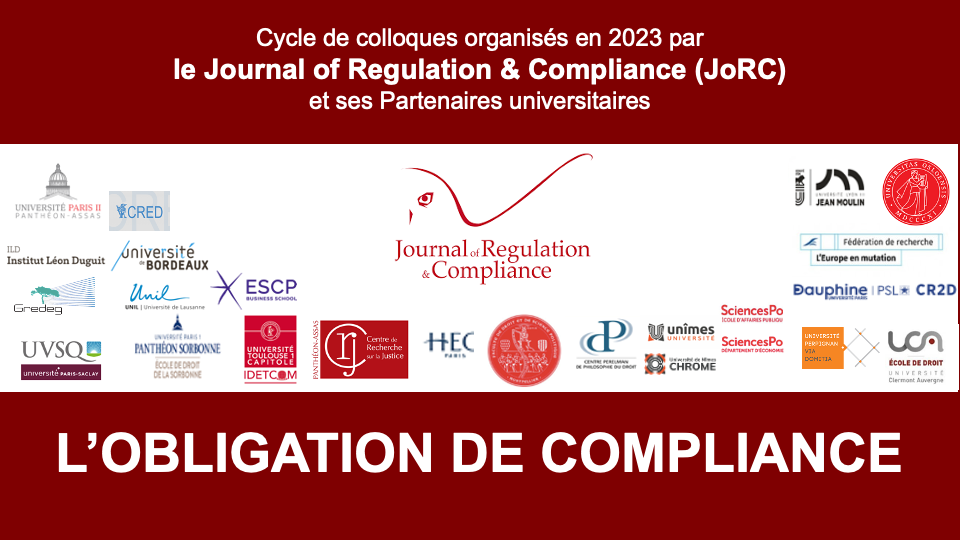
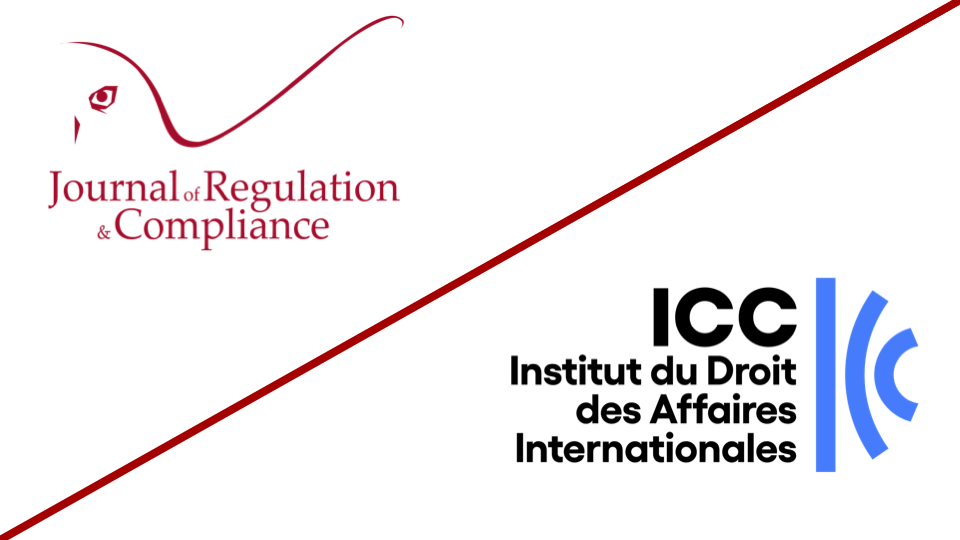
____
► Interviennent :
🎤 Laurent Aynès, emeritus Professor at Paris 1 Panthéon-Sorbonne University, Attorney, Darrois Villey Maillot Brochier (Paris)
🎤 Marie-Anne Frison-Roche, Professor of Regulatory and Compliance Law, Director of the Journal of Regulation & Compliance (JoRC)
🎤 Jean-François Guillemin, former General Secretary of the Bouygues Group
🎤 Christophe Lapp, Attorney, Advant Altana (Paris)
🎤 Jean-Baptiste Racine, Full Professor at Paris Panthéon-Assas University (Paris 2)
🎤 Eduardo Silva-Romero, President of the Institute of World Business Law of the ICC (Institute), Attorney, Wordstone (Paris)
____
🧮Read a detailed presentation of the event below⤵️
Feb. 3, 2024
Interviews

► Référence complète : Ch. Lapp, "L’usage par les entreprises des outils de la compliance (d’une façon non-mécanique)", entretien mené par M.-A. Frison-Roche à l'occasion d'une série d'entretiens sur le Droit de la Compliance, in Fenêtres ouvertes sur la gestion, émission de J.-Ph. Denis, Xerfi Canal, enregistré le 12 décembre 2023, diffusé le 3 février 2024
____
🌐consulter sur LinkedIn la présentation de l'interview de Christophe Lapp
____
🌐consulter sur LinkedIn le compte-rendu de l'interview de Christophe Lapp
____
🎥visionner l'interview complète sur Xerfi Canal
____
► Point de départ : En 2023 Christophe Lapp écrit une contribution sur 📝La compliance dans l'entreprise : les statuts du process, dans 📕La juridictionnalisation de la Compliance.
🧱lire la présentation de cette contribution ➡️cliquerICI
____
► Résumé de l'entretien :
Marie-Anne Frison-Roche. Question : Dans votre article vous affirmez qu’« il faut dépasser la conformité pour aller vers la Compliance », pouvez-vous nous en dire plus ?
Christophe Lapp. Réponse : Il répond que
____
MaFR. Q. : On dit souvent que la Compliance est perçue comme une perte de compétitivité. Quel est votre point de vue de praticien international ?
Ch.L. R. : Il répond que
____
MaFR. Q : Certaines entreprises s’interrogent sur l’over compliance ; que leur répondre ?
Ch.L. R.: Il répond que
________
Feb. 1, 2024
Conferences
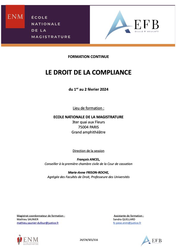
🌐follow Marie-Anne Frison-Roche on LinkedIn
🌐subscribe to the Newsletter MAFR Regulation, Compliance, Law
____
► Full Reference: M.-A. Frison-Roche, "Compliance et Responsabilité civile : comprendre et raison garder" ("Compliance and Civil Liability: understanding and keeping our heads"), in Droit de la compliance (Compliance Law), École nationale de la magistrature - ENM (French National School for the Judiciary) in collaboration with the École de Formation professionnelle des Barreaux du ressort de la cour d'appel de Paris - EFB (Paris Bar School), Paris, February 1, 2024.
____
► This conference is given in French.
____
🧮see the full programme of this event (in French)
____
🌐consult on LinkedIn a general presentation of this event, which links to a presentation of each speech (in French)
____
____
🔲see the slides used to support the presentation (in French)
____
📝This conference and the Working Paper on which it is based are to be linked with the article to be published in the book📘Compliance Obligation
____
🎤see a presentation of the conference "Droit de la Compliance : tour d'horizon" ("Compliance Law: overview"), given at the same symposium
____
► Presentation of the conference : It is difficult, even artificial, to separate the presentation of the relationship between Compliance Law and Civil Liability from the consideration given in Compliance to Criminal Liability, sanctions and the whole contractual organisation. But, if only for reasons of time, this will be done.
The chosen method consists of using decisions handed down either under Compliance Law, an emerging branch of Law of which an overview has been given before📎
It always seems that civil liability and Compliance Law are both intimate and have a difficult relationship. To understand them, before embarking on crusades in one direction or another, it is technically necessary to look at the liabilities attached to the application of "compliance regulations" imposed on economic operators, who contractualise the resulting legal obligations and whose third parties may also rely on breaches on the grounds of civil liability. This is the first stage of the analysis. Much is made of the Vigilance technique. Even if this is the advances point of Compliance, we also need to look at the GDPR, the French co-called "Sapin 2" law, Anti-Corruption, etc.
However, civil liability is not the same depending on whether the obligation, legal and/or contractual, in relation to which it arises as a cause of action, gives rise, depending on the case, the text and the person, to an obligation of means or an obligation of result. If there is one principle to bear in mind, particularly in the mind of the judge, it is that, unless a text or clause provides otherwise, an obligation is an obligation of means.
This essential question raises the need to better define the "Compliance Obligation", which consists of prevention and detection, with the economic operator making his "best efforts" with regard to the monumental goals to which the various regulations (thus finding their unity) are normatively anchored. The Ex Ante evidential dimension thus comes to the fore.
In the second part of the analysis, which continues to be based on court decisions, we need to measure the "points of contact" between these "special compliance responsibilities" and the Ordinary Law of Civil Liability. Indeed, because this is a profound movement that runs through the entire legal system, expressing a social demand that distinguishes Western law from the rest of the world, Ordinary Liability Law has long had a preventive dimension and targets operators in a different way, not only because of their power, but also because of their "mission". This is expressly stated in the case law, and these points of contact do not justify opposing the two branches. It would only be if Compliance Law were confused with its instrument, "conformity", and if new principles were invented in an Ordinary Law, that clashes could arise.
In the third stage of the analysis, which can be applied to the principles at stake today, it should be remembered that while there is no general Compliance Obligation under Ordinary Law, which implies detecting and preventing for oneself and for others any breach of any applicable regulation likely to harm others, there is a principle of freedom, as the Conseil constitutionnel (French Constitutional Council) regularly reminds us. Unless we change the legal system so that people become nothing more than subjects who obey all regulations and let it be seen that they do so, with the judge's role being limited to punishing them for not doing so. Indeed, the principle of freedom remains the foundation both of the Ordinary Civil Liability Law (and not of repression, as in Chinese Law) and of the Special Law of Compliance (and not of conformity, as in Chinese law).
In conclusion, it appears that the evolution of Civil Liability, in particular due to the spirit of a Compliance Law that is articulated with it, is leading to a twofold movement: from Ex Post liability to Ex Ante responsibility📎
To accompany this movement, alliances are being forged and must be fostered, which brings Compliance Law face to face with Competition Law, alliances often forged by contract and for which the role of the judge is being renewed, particularly through mediation techniques.
________
Feb. 1, 2024
Teachings
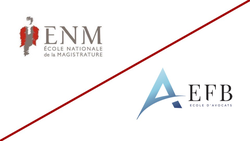
🌐follow Marie-Anne Frison-Roche on LinkedIn
🌐subscribe to the Newsletter MAFR Regulation, Compliance, Law
____
► Full Reference: F. Ancel & M.-A. Frison-Roche, Droit de la compliance (Compliance Law), École nationale de la magistrature - ENM (French National School for the Judiciary), in collaboration with the École de Formation professionnelle des Barreaux du ressort de la cour d'appel de Paris - EFB (Paris Bar School), Paris, February 1 and 2, 2024
This teaching is given in French.
____
____
► Presentation of the Teaching: The aim of this two-day conference is to enable judges and lawyers to grasp the issues, objectives and methods that define Compliance Law as it is practised in companies.
The speakers will illustrate the growing trend towards litigation, which is difficult to reconcile with the supranational dimension, or even indifference to territories, for example when disputes concern systemic climate or digital issues: the result is a renewal of the role of the judge and the role of lawyers.
This must be set against the renewal of the role and operation of companies themselves.
This is analysed from the perspective of Civil Law, in particular Contract Law and Liability Law. Company Law and Criminal Law are also addressed, as well as the way in which the legal system now integrates governance, regulation, climate and digital issues and the smooth operation of financial markets through Compliance techniques.
____
► Organisation of the Teaching: This conference is divided into two parts.
The first day is designed as a presentation of the major themes through which Compliance Law crosses the branches of traditional Law. The speakers will be professors of Law who will successively summarise the branches of Law and put into perspective the way in which Compliance imperatives give rise to new situations, new difficulties and new solutions.
This enables the second day to focus on practical and topical issues and to debate controversial questions between people of different sensibilities. The participants tend to be judges, members of regulatory authorities, lawyers, members of associations and so on.
____
► Enrolment procedure: The course is open to all judicial and consular magistrates, as well as lawyers.
Registrations can be made directly with the ENM or with the EFB.
____
► Speakers :
🎤François Ancel, Judge at the Première Chambre civile de la Cour de cassation (First Civil Chamber of the French Court of cassation)
🎤Thomas Baudesson, Attorney at the Paris Bar, Partner at Clifford Chance
🎤Guillaume Beaussonie, Full Professor at Toulouse 1 Capitole University
🎤Jacques Boulard, Premier Président de la Cour d’appel de Paris (First President of the Paris Court of Appeal)
🎤Marie Caffin-Moi, Full Professor at Paris Panthéon-Assas University
🎤Malik Chapuis, Judge at the Tribunal judiciaire de Paris (Paris First Instance Civil Court)
🎤Lucie Chatelain, Advocacy and Litigation Manager - Civil Liability of Parent Companies, Sherpa
🎤Jean-Benoît Devauges, Directeur Juridique, Ethique et Gouvernance des entreprises (Legal, Ethics and enterprises governance Director), MEDEF
🎤Marie-Anne Frison-Roche, Professor of Regulatory and Compliance Law, Director of the Journal of Regulation & Compliance (JoRC)
🎤Arnaud Gossement, Attorney at the Paris Bar, Partner at Gossement Avocats
🎤Thibault Goujon-Bethan, Full Professor at Jean Moulin Lyon 3 University
🎤Christophe Ingrain, Attorney at the Paris Bar, Partner at Darrois Villey Maillot Brochier
🎤Isabelle Jegouzo, Director of the Agence française anticorruption - AFA (French Anti-Corruption Agency)
🎤Anne-Valérie Le Fur, Full Professor at Versailles Saint-Quentin-en-Yvelines University
🎤Charlotte Michon, Attorney at the Paris Bar, partner at Charlotte Michon Avocat
🎤Jean-Baptiste Racine, Full Professor at Paris Panthéon-Assas University
🎤 Jean-Christophe Roda, Full Professor at Jean-Moulin Lyon 3 University
🎤Jérôme Simon, 1er Vice-Procureur Financier (First Financial Vice-Prosecutor)
____
🧮read below the programme put together and organised by François Ancel and Marie-Anne Frison-Roche, as well as the reports of each presentation⤵️
Feb. 1, 2024
Conferences

🌐follow Marie-Anne Frison-Roche on LinkedIn
🌐subscribe to the Newsletter MAFR Regulation, Compliance, Law
____
► Full Reference: M.-A. Frison-Roche, "Droit de la compliance : tour d'horizon" ("Compliance Law: Overview"), in Droit de la compliance (Compliance Law), École nationale de la magistrature - ENM (French National School for the Judiciary) in collaboration with the École de Formation professionnelle des Barreaux du ressort de la cour d'appel de Paris - EFB (Paris Bar School), Paris, February 1, 2024.
____
► This conference is given in French
____
🧮see the full programme of this event (in French)
____
🌐consult on LinkedIn a general presentation of this event, which links to a presentation of each speech (in French)
____
____
🔲see the slides used to support the presentation (in French)
____
🎤see a presentation of the other speech about "Compliance et Responsabilité civile : comprendre et raison garder" ("Compliance and Civil Liability: understanding and keeping our heads"), given at the same symposium
____
► Presentation of the conference: Compliance Law is mysterious in itself, because it is still in creation📎
Because the purpose of this conference is to introduce the two days of a training course designed for magistrates and open to lawyers, it only provides an "overview" of, so that we do not get lost in the sprawling regulations, the global mechanisms and the political ambitions that permeate them.
Therefore, without going into any of the subjects, it is about opening up four ways of entering what is a branch of Law that is being born before our eyes:
1. Understanding Compliance Law through "regulations"
2. Understanding Compliance Law through "tools"📎
3. Understanding Compliance Law through "methods"
4. Understanding Compliance Law through "goals"📎
The four approches are legitimate because the four dimensions are articulated in the legal system, notably case law.
But the more positive Law is consolidated, the more its normativity through the goals that give normativity, or even a simplicity without which the whole is not humanly controllable.
These Goals are Monumental and Europe bears them more and better than other areas of the world📎
________
🕴️M.-A. Frison-Roche, 📝Naissance d'une branche du Droit : le Droit de la Compliance (Birth of a branch of Law : Compliance Law), to be published.
🕴️M.-A. Frison-Roche (ed.), 📘Compliance Jurisdictionalisation, 2023.
🕴️M.-A. Frison-Roche (ed.), 📘Compliance Tools, 2020.
🕴️M.-A. Frison-Roche (ed.), 📘Compliance Monumental Goals, 2023.
Jan. 26, 2024
Publications

🌐follow Marie-Anne Frison-Roche on LinkedIn
🌐subscribe to the Newsletter MAFR Regulation, Compliance, Law
____
► Full Reference: M.-A. Frison-Roche (ed.), Compliance Jurisdictionalisation, Journal of Regulation & Compliance (JoRC) and Bruylant, "Compliance & Regulation" Serie, 2024, 464 p.
____
► General presentation of the book: Sanctions, controls, appeals, deals: judges and lawyers are everywhere in the Compliance mechanisms, creating unprecedented situations, sometimes without a solution yet available. Even though Compliance was designed to avoid the judge and produce security by avoiding conflict. This jurisdictionalisation is therefore new. Forcing companies to prosecute and judge, a constrained role, perhaps against their nature. Leading to the adaptation of major procedural principles, with difficulty. Confronting arbitration with new perspectives. Putting the judge at heart, in mechanisms designed so that he is not there. How in practice to organize these opposites and anticipate the solutions? This is the challenge taken up by this book.
____
► Summary of the book: There have always been Judges and Lawyers in Compliance Law, in particular because this branch of Law is an extension of Regulatory Law in which they have a core place. This results from the fact that the decisions taken in respect of Compliance are contestable in Court, including Arbitration, those issued by the Company, such as those of States or Authorities, the Judge in turn becoming what Compliance Law is effective.
The novelty lies more in the phenomenon of "jurisdictionalisation", that is to say that the trial model penetrates all Compliance Law, and not only the Ex Post part that it includes. Moreover, it seems that this jurisdictionalisation influences the non-legal dimension of Compliance. This movement has effects that must be measured and causes that must be understood. Advantages and disadvantages that must be balanced. If only to form an opinion vis-à-vis Companies that have become Prosecutors and Judges of themselves and others ...: encourage this "Jurisdictionalisation of Compliance", fight it, perhaps influence it? In any case, understand it!
____
🏗️General construction of the book:The book opens with a double Introduction. The first, which is freely accessible, consists of a summary of the book, while the second, which is substantial, deals with the need to bring the Judge and the Lawyer into line if Compliance Law is to be the hallmark of States governed by the Rule of Law.
The first Chapter is devoted to what is specific to Compliance Law: the transformation of companies into Prosecutors and Judges of themselves, and even of others. The second Chapter examines the interference between General Procedural Law and Compliance techniques. The third Chapter measures the influence of the reasoning and requirements of Compliance Law in methods of dispute resolution where it has not, with a few exceptions, been present, but where it has a great future: arbitration. Because trials and judgements are indissociable, because legal techniques and the Rule of Law must not be dissociated, and because Compliance techniques could paradoxically be the weapon used to dissociate them, because the power to judge and the procedures surrounding it must not be dissociated, because Compliance and the Rule of Law must therefore be conceived and practised together, the rise in power of one being a sign of the rise in power of the other, and not the price of the weakening of the Rule of Law, the fourth Chapter deals with the role of the Judge in Compliance.
____
TABLE OF CONTENTS
DOUBLE INTRODUCTION
🕴️M.-A. Frison-Roche, 📝Main Aspects of the book Compliance Jurisdictionalisation
🕴️M.-A. Frison-Roche, 📝Reinforce the Judge and the Lawyer to impose Compliance Law as a characteristic of the Rule of Law
I. THE COMPANY ESTABLISHED PROSECUTOR AND JUDGE OF ITSELF BY COMPLIANCE LAW
🕴️M.-A. Frison-Roche, 📝The "Judge-Judged". Articulating Words and Things in the face of Conflicts of Interest
🕴️C. Granier, 📝Reflections on the existence of companies’ jurisprudence through Compliance matters
🕴️L.-M. Augagneur, 📝The jurisdictionalisation of reputation by platforms
🕴️A. Bruneau, 📝The compagny judges itself: the Compliance function in the bank
🕴️J.-M. Coulon, 📝Compliance Law in the construction industry and the contradictions, impossibilities and. deadlocks that companies face
🕴️Ch. Lapp, 📝Compliance in companies: the statues of process
🕴️J. Heymann, 📝The Legal Nature of the Facebook "Supreme Court"
🕴️D. Latour, 📝Internal investigations within companies
🕴️A. Bavitot, 📝Shaping the company through negotiated Criminal Justice Agreements. French perspective
🕴️S. Merabet, 📝Vigilance, being a judge and not judge
II. PROCEDURAL LAW IN COMPLIANCE LAW
🕴️N. Cayrol, 📝Procedural Principles in Compliance Law
🕴️F. Ancel, 📝Compliance Law, a new guiding principle for the Trial?
🕴️B. Sillaman, 📝Taking the Compliance U.S. Procedural Experience globally
🕴️S. Scemla, & 🕴️D. Paillot, 📝The difficulty for Compliance Enforcement Authorities to comprehend the Rights of the Defence in compliance matters
🕴️M.-A. Frison-Roche, 📝Adjusting General Procedural Law to Compliance Law by the nature of things
III. ARTICULATION BETWEEN COMPLIANCE LAW AND INTERNATIONAL ARBITRATION
🕴️J.-B. Racine, 📝Compliance and arbitration. An attempt at problematisation
🕴️E. Silva-Romero & 🕴️R. Legru, 📝What place is there for compliance in investment arbitration?
🕴️M. Audit, 📝The arbitrator's position on compliance
🕴️E. Kleiman, 📝The objectives of compliance confronted with the actors of arbitration
IV. THE JUDGE IN COMPLIANCE LAW
🕴️M.-A. Frison-Roche, 📝The Judge, the Compliance Obligation and the Company. The Compliance Evidence System
🕴️J. Morel-Maroger, 📝The application of compliance standards by European Union judges
🕴️S. Schiller, 📝A single judge in the event of an international breach of compliance obligations?
🕴️O. Douvreleur, 📝Compliance and Judge of the Law
🕴️F. Raynaud, 📝The Administrative Judge and Compliance
🕴️E. Wennerström, 📝Some Reflections on Compliance and the European Court of Human Rights
________
Jan. 26, 2024
Editorial responsibilities : Direction of the collection Compliance & Regulation, JoRC and Bruylant

🌐follow Marie-Anne Frison-Roche on LinkedIn
🌐subscribe to the Newsletter MAFR Regulation, Compliance, Law
____
► Full Reference: M.-A. Frison-Roche (ed.), Compliance Jurisdictionalisation, Journal of Regulation & Compliance (JoRC) and Bruylant, "Compliance & Regulation" Serie, 2024, 464 p.
____
📕In parallel, the French version of this book, La juridictionnalisation de la Compliance, is published in the collection co-published by the Journal of Regulation & Compliance (JoRC) and Dalloz
____
🧮This book comes after a cycle of colloquia organised in 2021 by the Journal of Regulation & Compliance (JoRC) and its Academic Partners
____
► General presentation of the book: Sanctions, controls, appeals, deals: judges and lawyers are everywhere in the Compliance mechanisms, creating unprecedented situations, sometimes without a solution yet available. Even though Compliance was designed to avoid the judge and produce security by avoiding conflict. This jurisdictionalisation is therefore new. Forcing companies to prosecute and judge, a constrained role, perhaps against their nature. Leading to the adaptation of major procedural principles, with difficulty. Confronting arbitration with new perspectives. Putting the judge at heart, in mechanisms designed so that he is not there. How in practice to organize these opposites and anticipate the solutions? This is the challenge taken up by this book.
____
This volume is the continuation of the books dedicated to Compliance in this collection.
📚Read the presentation of the other books of this collection:
- further books:
🕴️M.-A. Frison-Roche (ed.), 📘Compliance Obligation, 2024
- previous books:
🕴️M.-A. Frison-Roche (ed.), 📘Compliance Monumental Goals, 2023
🕴️M.-A. Frison-Roche (ed.), 📘Compliance Tools, 2021
____
► Summary of the book: There have always been Judges and Lawyers in Compliance Law, in particular because this branch of Law is an extension of Regulatory Law in which they have a core place. This results from the fact that the decisions taken in respect of Compliance are contestable in Court, including Arbitration, those issued by the Company, such as those of States or Authorities, the Judge in turn becoming what Compliance Law is effective.
The novelty lies more in the phenomenon of "jurisdictionalisation", that is to say that the trial model penetrates all Compliance Law, and not only the Ex Post part that it includes. Moreover, it seems that this jurisdictionalisation influences the non-legal dimension of Compliance. This movement has effects that must be measured and causes that must be understood. Advantages and disadvantages that must be balanced. If only to form an opinion vis-à-vis Companies that have become Prosecutors and Judges of themselves and others ...: encourage this "Jurisdictionalisation of Compliance", fight it, perhaps influence it? In any case, understand it!
____
🏗️General construction of the book:
The book opens with a double Introduction. The first, which is freely accessible, consists of a summary of the book, while the second, which is substantial, deals with the need to bring the Judge and the Lawyer into line if Compliance Law is to be the hallmark of States governed by the Rule of Law.
The first Chapter is devoted to what is specific to Compliance Law: the transformation of companies into Prosecutors and Judges of themselves, and even of others.
The second Chapter examines the interference between General Procedural Law and Compliance techniques.
The third Chapter measures the influence of the reasoning and requirements of Compliance Law in methods of dispute resolution where it has not, with a few exceptions, been present, but where it has a great future: arbitration.
Because trials and judgements are indissociable, because legal techniques and the Rule of Law must not be dissociated, and because Compliance techniques could paradoxically be the weapon used to dissociate them, because the power to judge and the procedures surrounding it must not be dissociated, because Compliance and the Rule of Law must therefore be conceived and practised together, the rise in power of one being a sign of the rise in power of the other, and not the price of the weakening of the Rule of Law, the fourth Chapter deals with the role of the Judge in Compliance.
____
► Understand the book through the table of contents below and the summaries of each article :
DOUBLE INTRODUCTION
🕴️M.-A. Frison-Roche, 📝Main Aspects of the book Compliance Jurisdictionalisation
🕴️M.-A. Frison-Roche, 📝Reinforce the Judge and the Lawyer to impose Compliance Law as a characteristic of the Rule of Law
I. THE COMPANY ESTABLISHED PROSECUTOR AND JUDGE OF ITSELF BY COMPLIANCE LAW
🕴️M.-A. Frison-Roche, 📝The "Judge-Judged". Articulating Words and Things in the face of Conflicts of Interest
🕴️C. Granier, 📝Reflections on the existence of companies’ jurisprudence through Compliance matters
🕴️L.-M. Augagneur, 📝The jurisdictionalisation of reputation by platforms
🕴️A. Bruneau, 📝The compagny judges itself: the Compliance function in the bank
🕴️J.-M. Coulon, 📝Compliance law in the construction industry and the contradictions, impossibilities and deadlocks that companies face
🕴️Ch. Lapp, 📝Compliance in companies: the statues of process
🕴️J. Heymann, 📝The Legal Nature of the Facebook "Supreme Court"
🕴️D. Latour, 📝Internal investigations within companies
🕴️A. Bavitot, 📝Shaping the company through negotiated Criminal Justice Agreements. French perspective
🕴️S. Merabet, 📝Vigilance, being a judge and not judge
II. PROCEDURAL LAW IN COMPLIANCE LAW
🕴️N. Cayrol, 📝Procedural Principles in Compliance Law
🕴️F. Ancel, 📝Compliance Law, a new guiding principle for the Trial?
🕴️B. Sillaman, 📝Taking the Compliance U.S. Procedural Experience globally
🕴️S. Scemla, & 🕴️D. Paillot, 📝The difficulty for Compliance Enforcement Authorities to comprehend the Rights of the Defence in compliance matters
🕴️M.-A. Frison-Roche, 📝Adjusting General Procedural Law to Compliance Law by the nature of things
III. ARTICULATION BETWEEN COMPLIANCE LAW AND INTERNATIONAL ARBITRATION
🕴️J.-B. Racine, 📝Compliance and arbitration. An attempt at problematisation
🕴️E. Silva-Romero & 🕴️R. Legru, 📝What place is there for compliance in investment arbitration?
🕴️M. Audit, 📝The arbitrator's position on compliance
🕴️E. Kleiman, 📝The objectives of compliance confronted with the actors of arbitration
IV. THE JUDGE IN COMPLIANCE LAW
🕴️M.-A. Frison-Roche, 📝The Judge, the Compliance Obligation and the Company. The Compliance Evidence System
🕴️J. Morel-Maroger, 📝The application of compliance standards by European Union judges
🕴️S. Schiller, 📝A single judge in the event of an international breach of compliance obligations?
🕴️O. Douvreleur, 📝Compliance and Judge of the Law
🕴️F. Raynaud, 📝The Administrative Judge and Compliance
🕴️E. Wennerström, 📝Some Reflections on Compliance and the European Court of Human Rights
________
Jan. 22, 2024
Hearings by a Committee or Public organisation

🌐suivre Marie-Anne Frison-Roche sur LinkedIn
🌐s'abonner à la Newsletter MAFR Regulation, Compliance, Law
____
► Référence complète : M.-A. Frison-Roche, audition notamment par Maître Sophie Bonne et Maître Anne-Claire Ancelin, respectivement présidente et rapporteure de la Commission du Conseil Supérieur du Notariat (CSN), élaborant un rapport sur Compliance : un espace à conquérir ?, 22 janvier 2024, CSN, Paris..
____
► Résumé de la présentation : j'ai eu l'occasion d'étudier et de discuter des relations entre le notaire comme professionnel et le notariat comme structure de régulation d'une part et le Droit de la Compliance, d'autre part.
Je l'ai fait lors des travaux du Conseil Supérieur du Notariat sur la raison d'être, dans une audition avec la Commission du CSN en charge de la réflexion à ce propos et et d'une façon plus générale à propos de l'articulation entre l'office du notariat et les mécanismes juridiques de régulation, car le Droit de la Compliance est le prolongement du Droit de la Régulation. J'ai d'ailleurs à ce titre fait une masterclass sur le droit de la compliance lors du Congrès annuel de 2022 à ce sujet.
M'appuyant sur ces premières réflexions et discussions, je peux articuler les propos suivants:
0. Observation préalable : l'intitulé semble sous-entendre que la compliance serait un espace nouveau, où le notariat serait étranger et qu'il faudrait "conquérir" cette terra incognita , le point d'interrogation permettant de suggérer que, si nouveau soit le Droit de la Compliance, c'est plutôt dans les professions agissant en Ex Ante qu'il est le moins "étranger" et que l'espace est donc déjà le plus "naturel".
L'enjeu est plutôt dans l'ambition que l'on peut en avoir : soit une ambition faible ("conformité"), soit une ambition forte ("Droit de la Compliance").
1. Un espace restreint aujourd'hui et plus encore demain si l'on réduit la Compliance à ce qui n'est que son outil : la conformité. Cette réduction équivaut à un grand dommage, car les algorithmes sont aptes à prendre en charge la conformité, et font le faire le plus en plus, tandis que la compliance est maniée par les êtres humains. La conformité est, mais n'est que, un outil de la Compliance.
2. La Compliance se définit par les Buts Monumentaux
- Les Buts monumentaux sont fixés par les Autorités politiques et publiques et ne peuvent être fixés que par elles ; le déploiement des moyens peuvent être déploient par d'autres que l'administration
3. Pragmatiquement, les buts monumentaux unifient la "masse réglementaire"
4. Tendre, dans une trajectoire, vers eux nécessite des êtres humains qui se coordonnent et agissent ensemble (ensemble du modèle concurrentiel)
5. Ils constituent la Compliance comme une branche ex ante du Droit
6. Ils placent le Droit de la Compliance en déploiement du Droit de la Régulation
7. Le Notariat est alors tout d'abord un "agent d'effectivité de la conformité", se dotant pour cela notamment des outils algorithmiques
8. Le Notariat est aussi une profession humaniste qui aide l'Etat, les entreprises et les parties intéressées à tendre vers la protection des êtres humains, pour qu'ils ne soient pas broyés par les systèmes devenus plus menaçants (but monumental négatif) et qu'ils en bénéficient (but monumental positif)
9. En cela, le Notariat, comme le Juge et l'Avocat, doit être consolidé dans sa structure, et doit aussi se présenter, au niveau du professionnel, au niveau de l'étude, au niveau de la profession structurée
10. Le Notariat doit aussi conforter sa gouvernance dans ce nouveau système de Compliance qui est en lien avec l'Etat de Droit et la Démocratie.
____
► Voir dans mes travaux ceux qui peuvent présenter un intérêt au regard de cette audition ⤵️
🕴️M.-A. Frison-Roche, 🖥️Appliquer la notion de "Raison d'être à la profession du Notariat, 2021
🕴️M.-A. Frison-Roche,🎤La compliance pour les études notariales : aspects théoriques et pratiques, Congrès des notaires , 2022
🕴️M.-A. Frison-Roche,📝Notariat et régulation font bon ménage, 2015
🕴️M.-A. Frison-Roche, 💬La profession investit le Droit de la Compliance et détermine sa Raison d'Etre, 2023
🕴️M.-A. Frison-Roche (dir.), 📕Les Buts Monumentaux de la Compliance, 2022
🕴️M.-A. Frison-Roche, 📝Penser et manier la Vigilance par ses Buts Monumentaux de Compliance, mars 2023.
🕴️M.-A. Frison-Roche, 📝Contrat de compliance, clauses de compliance, 2022.
🕴️M.-A. Frison-Roche, 🚧L'invention de la vigilance : un terme nouveau pour une Responsabilité en Ex Ante, 2021.
🕴️M.-A. Frison-Roche, 📝Synthèse : Le rôle du juge dans le déploiement du droit de la régulation par le droit de la compliance, à paraître
🕴️M.-A. Frison-Roche, 📝Le Droit de la compliance, 2016.
________
Jan. 17, 2024
Thesaurus : Doctrine

► Référence complète : N. Leroy & D. Zucker, "L’apport de la psychologie pour l'effectivité des droits de la défense dans l'enquête interne pour harcèlement au travail", in M.-A. Frison-Roche et M. Boissavy (dir.), Compliance et droits de la défense. Enquête interne – CJIP – CRPC, Journal of Regulation & Compliance (JoRC) et Dalloz, coll. "Régulations & Compliance" à paraître.
____
📕consulter une présentation générale de l'ouvrage, Compliance et droits de la défense - Enquête interne, CIIP, CRPC, dans lequel cet article est publié
____
► Résumé de l'article (fait par le Journal of Regulation & Compliance - JoRC) : Les auteures, l'une avocate et l'autre psychologue clinique, soulignent tout d'abord les spécificités, et notamment les difficultés propres aux enquêtes internes requises dans les entreprises lorsqu'il s'agit de faits d'harcèlement sexuel ou moral.
L'objet de l'article est de montrer le fruit d'une collaboration étroite entre le juriste et le psychologue dans un tel cas, notamment pour que s'établisse un dialogue où chacun peut s'exprimer et être protégé, ce qui est une façon de faire vivre les droits de la défense.
Dans ce qu'elles qualifient de "regards croisés", requis par le fait que le harcèlement est un "concept psychologique" auquel le Droit attache des conséquences juridiques, il convient de ne pas se limiter à une approche strictement factuelle et organisationnelle.
La maîtrise de la psychologie permet de donner pertinence à des attitudes qui ne sont pas juridiquement répréhensibles. Il convient donc de développer une méthodologie adéquate, par une analyse complémentaire à l'analyse factuelle et juridique, intégrant des indices de personnalité, considérant le stress post-traumatique, décodant ce qui peut être un système de harcèlement. En outre, une méthode doit renforcer la fiabilité des entretiens pour que la parole de chacun puisse y prendre sa place (technique d'audition, renforcement des compétences personnelles)
____
🦉Cet article est accessible en texte intégral pour les personnes inscrites aux enseignements de la Professeure Marie-Anne Frison-Roche
________
Jan. 17, 2024
Thesaurus : Doctrine

► Référence complète : M. Durand-Poincloux, D. Apelbaum et P. Sardi-Antasan, "Regard critique : La place des droits de la défense dans l’enquête interne selon le guide AFA/PNF", in M.-A. Frison-Roche et M. Boissavy (dir.), Compliance et droits de la défense. Enquête interne – CJIP – CRPC, Journal of Regulation & Compliance (JoRC) et Dalloz, coll. "Régulations & Compliance" à paraître.
____
📕consulter une présentation générale de l'ouvrage, Compliance et droits de la défense - Enquête interne, CIIP, CRPC, dans lequel cet article est publié
____
► Résumé de l'article (fait par le Journal of Regulation & Compliance - JoRC) : Les auteurs présentent le guide publié en 2023 par l'Agence française anticorruption (AFA) et le Parquet national financier (PNF), Les enquêtes internes anticorruption. Guide pratique, en ce qu'ils estiment que les droits de la défense n'y ont pas la place qui devrait être celle impliquée par les principes généraux. Ils estiment que les garanties procédurales sont insuffisantes pour la personne poursuivie.
Plus encore, parce que l'avocat n'y aurait pas les moyens dont il serait légitime qu'il dispose, ce sont les droits de l'entreprise qui procède à l'enquête interne qui sont de ce fait méconnus. Les auteurs en concluent que ce guide opère ainsi une sorte de "retour en arrière" par rapport aux principes qui gouvernent la répression, notamment en ce que le rapport qui résulte de l'enquête n'est protégé par aucun secret.
____
🦉Cet article est accessible en texte intégral pour les personnes inscrites aux enseignements de la Professeure Marie-Anne Frison-Roche
________

Jan. 12, 2024
Organization of scientific events
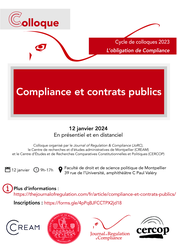
🌐follow Marie-Anne Frison-Roche on LinkedIn
🌐subscribe to the Newsletter MAFR Regulation, Compliance, Law
____
► Full Reference: M.-A. Frison-Roche, C. Gilles and A. Oumedjkane (dir.), Compliance et contrats publics (Compliance and public contracts), Journal of Regulation & Compliance (JoRC), Centre de recherches et d’études administratives de Montpellier (CREAM) and Centre d’Études et de Recherches Comparatives Constitutionnelles et Politiques (CERCOP) of the Montpellier University, Faculté de droit et de science politique de Montpellier, January 12, 2024
____
🌐consult a general presentation of this event on LinkedIn, linking to a presentation of each speech (in French)
____
🏗️This symposium takes place in the cycle of symposiums organised by the Journal of Regulation & Compliance (JoRC) and its partners Universities, focusing in 2023-2024 on the general theme of the Compliance Obligation
____
📚The works will then be inserted in the books:
📕Compliance et contrat, to be published in the 📚Régulations & Compliance Serie, co-published by the Journal of Regulation & Compliance (JoRC) and Dalloz, published in French.
📘Compliance & Contract, to be published on the 📚Compliance & Regulation Serie, co-published by the Journal of Regulation & Compliance (JoRC) and Dalloz, published in English.
____
► General presentation of the symposium: Compliance is developing throughout the legal system, through both Public and Private Law techniques. Public Contract Law bears witness to this in two ways: through its scope, in that Compliance applies to economic relationships entered into by public bodies, and through its object, which internalises a reconciliation between their economic interests and a set of other general interest objectives, or "Monumental Goals", a reconciliation for which public bodies have traditionally been responsible. In addition to unilateral acts, contracts have their rightful place as a practical means of achieving this reconciliation. Its flexibility allows for negotiation and adjustment of the burdens to be placed on the co-contracting parties.
The aim of this symposium is to link the different manifestations of the Compliance Obligation in public contracts and thus give coherence to policies which are still too often considered in a watertight manner because they relate to very different aims and areas.
Firstly, at the procurement stage, the promotion of responsible or innovative procurement, particularly from an environmental point of view, is one of the signs of Compliance's presence. On a completely different note, the same is true of the CJEU's challenge to the automatic application of bans on tendering, which prevent contracting authorities from ruling on a candidate's reliability by taking into account the compliance programmes implemented by companies since their conviction.
Secondly, at the litigation stage, the Conseil d'État's (French Council of State) recent broad recognition of the illegality of an administrative contract on the grounds of a breach of ethical obligations has tempered the drive to make contracts more secure, drawing the consequences of the major drive for transparency in public life that has been underway since 2013.
The aim of the morning session will be to understand the various forms of the Compliance Obligation in public contracts. This overview will make it possible, in the afternoon, to aim to unify the Compliance Obligation in public contracts.
____

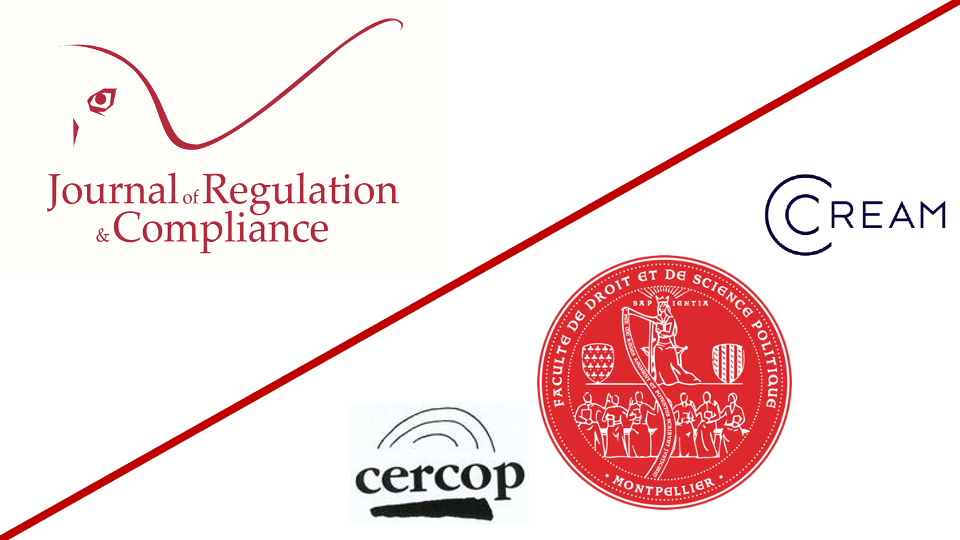
____
► Speakers:
🎤Ugo Assouad, PhD student at the Montpellier University, CREAM
🎤Philippe Augé, President of the Montpellier University
🎤Clémence Ballay-Petizon, PhD student at the Montpellier University, CREAM
🎤Yannisse Benrahou, PhD student at Paris-Nanterre University, CRDP
🎤Léon Boijout, PhD student at the Montpellier University, CREAM
🎤Julien Bonnet, Full Professor at the Montpellier University, CERCOP
🎤Guylain Clamour, Dean of the Montpellier Faculty of Law and Political Science
🎤Marie-Anne Frison-Roche, Professor of Regulatory and Compliance Law, Director of the Journal of Regulation & Compliance (JoRC)
🎤Pierre-Yves Gadhoun, Professor at the Montpellier University, CERCOP
🎤Pascale Idoux, Professor at the at the Montpellier University, CREAM
🎤Nedjma Kontoukas, PhD student at the Montpellier University, CREAM
🎤Valentin Lamy, Senior Lecturer at the Lorraine University, IRENEE
🎤Antoine Oumedjkane, Senior Lecturer at Lille University, ERDP
🎤Lucien Rapp, Emeritus Professor at Toulouse Capitole University
🎤Marion Ubaud-Bergeron, Full Professor at the Montpellier University, CREAM
____
🧮Read a detailed presentation of the event below⤵️
Jan. 12, 2024
Thesaurus : Doctrine
► Référence complète : M. Mekki, "Pour une compliance notariale", JCP N, n° 01-02, 12 janvier 2024, étude n° 1000, pp. 31-34
____
► Résumé de l'article (fait par l'auteur) : "Le droit est souvent appréhendé sous l'angle des risques qu'il crée ou qu'il canalise, cadre dans lequel la logique de compliance, outils de prévention et de gestion des risques systémiques, se déploie de manière exponentielle. Dans ce contexte, le notaire s'impose, en sa qualité d'officier public et ministériel, comme un acteur privilégié non seulement pour conseiller les entreprises qui s'engagent dans cette démarche proactive de compliance, mais également et surtout en sa qualité de gardien, Gatekeeper, enrichissant le service public de la sécurité juridique et numérique d'une nouvelle mission : contribuer à prévenir et à gérer les risques systémiques, dans une logique de régulation, principalement dans le domaine de la lutte contre la corruption, le blanchiment des capitaux et le financement des activités illicites, risques systémiques plus intenses en raison principalement de la dématérialisation des actifs (crypto-actifs) et de l'internationalisation des échanges."
____
🦉Cet article est accessible en texte intégral pour les personnes inscrites aux enseignements de la Professeure Marie-Anne Frison-Roche
________
Jan. 12, 2024
Conferences

🌐follow Marie-Anne Frison-Roche on LinkedIn
🌐subscribe to the Newsletter MAFR Regulation, Compliance, Law
____
► Full Reference : M.-A. Frison-Roche, "Conclusion. Compliance et contrats publics : une alliance naturelle" ("Conclusion. Compliance and Public Contracts: a natural alliance"), in M.-A. Frison-Roche, C. Gilles & A. Oumedjkane (dir.), Compliance et contrats publics (Compliance and public contracts), Journal of Regulation & Compliance (JoRC), Centre de recherches et d’études administratives de Montpellier (CREAM) and Centre d’Études et de Recherches Comparatives Constitutionnelles et Politiques (CERCOP) of the Montpellier University, Faculté de droit et de science politique de Montpellier, 39 rue de l’Université, Amphiteatre C Paul Valéry, January 12, 2024
____
🧮see the full programme of this event
____
✏️read the notes taken on the spot to draw up the symposium conclusion
____
🌐consult on LinkedIn a general presentation of this event, which links to a presentation of each speech (in French)
____
🧱consult the co-organisation sheet of this event, giving an account of the various speakers
____
► English Summary of the conference: Firstly, it would appear that, as with all the contracts studied in the area of Compliance, public contracts are, for the public authorities or public companies, an instrument through which they implement the Compliance Obligation imposed on them by the laws and regulations. Public bodies involved in public contracts are particularly concerned because of the points of contact, even intimacy, between Compliance Law and the general interest. But the contract, whether public or private, remains in its classic conception what results from the expression of two wills which exchange their consents📎
Secondly, in terms of free will, public contracts can be the means by which public bodies and their co-contractors express their conception of what needs to be done to preserve the future, for example in environmental and social matters. On the contrary, the seemingly technical issue of exclusions from public contracts, whether they be automatic exclusions or optional exclusions, expresses the extent to which economically powerful players (public authorities, municipalities, public companies) take care of each other. In this respect, Compliance Law runs counter to Competition Law📎
But thirdly, the public contract, in that it expresses the general interest by its very nature, its ex ante nature reinforces regulatory action and the nature of Compliance as an extension of Regulation📎
Moreover, fourthly, the public contract appears to be the model for the Compliance Contract. The public contract is a model first of all because of the central place of the general interest. The "Monumental Goals" in which the substantive definition of Compliance Law is anchored📎
The public contract is also a model because the contract is handled by a powerful party, in this case the public entity. The subject of Compliance Law is the powerful company, and only that company, chosen because it is powerful and because it uses that power to achieve the Monumental Goals. In this respect, the "exorbitant powers" that characterise the public contractor are reconstituted either by Compliance laws or by stipulations, which confer on all obliged or voluntary companies - by virtue of CSR, which has many points of contact with Compliance Law as long as it is not confused with obeying the applicable regulations (which is what "conformity" is)📎
The judge is the one who, through contractual litigation, both public and private, will bring to life these Monumental Goals desired by the State, carried by powerful entities (administration, companies), pledge of the Rule of Law📎
These include contractual mechanisms for information, audit, disclosure, control, collaboration, supervision, etc., through which the company, whether private or public, takes charge of the structure it has created, for example the value chain it masters📎
It can therefore be concluded that this logic of a public contract as an instrument of administrative action to achieve goals of general interest, now fully taken up in Compliance Law, must be acculturated into the Ordinary Contract Law and must be preserved in Public Contract Law, which presupposes a new balance with Competition Law, which for a long time carried within Public Law a contract model without concern for sustainability or the collective interest. To achieve this, dialogue between judges is essential. The Conseil d'État (French Council of State) and the Cour de cassation (French Court of cassation) set the example📎
____
📝This conference will be followed by an article, "The public contract, model of the Compliance Contract", which will be published in the book 📘Compliance and contract.
________
🕴️M.-A. Frison-Roche, 🚧Competition Law and Compliance Law, 2018.
🕴️M.-A. Frison-Roche (ed.), 📕Régulation, Supervision, Compliance (Regulation, Supervision, Compliance), 2017.
🕴️M.-A. Frison-Roche, 📝Compliance Monumental Goals, beating heart of Compliance Law, in 🕴️M.-A. Frison-Roche (ed.), 📘Compliance Monumental Goals, 2022.
🕴️M.-A. Frison-Roche, 📝Reinforce the Judge and the Lawyer to impose Compliance Law as a characteristic of the Rule of Law, in 🕴️M.-A. Frison-Roche (ed.), 📘Compliance Jurisdictionalisation, 2023.
🕴️M.-A. Frison-Roche, 📝Reinforce the Judge and the Lawyer to impose Compliance Law as a characteristic of the Rule of Law, in 🕴️M.-A. Frison-Roche (ed.), 📘Compliance Jurisdictionalisation, 2023.
🕴️M.-A. Frison-Roche, 📝Assessment of whistleblowing and the obligation of vigilance regarding International Competitiveness, in 🕴️M.-A. Frison-Roche (ed.), 📘Compliance Monumental Goals, 2022.
Conseil d'État (French Council of State) and Cour de cassation (French Court of cassation), 📗Du droit de la régulation au droit de la compliance : quel rôle pour le juge ?, La Documentation Française, 2024 (to be published).
Jan. 4, 2024
Thesaurus : Doctrine
► Référence complète : V. Lasserre, "Les sources textuelles internes et européennes du droit des affaires. L'exemple du devoir de vigilance", JCP E, n° 1, 4 janvier 2024, étude n° 1002, pp. 23-27
____
► Résumé de l'article (fait par l'auteure) : "Comprendre la loi sur le devoir de vigilance est utile. Premièrement, parce que ce devoir est un modèle qui tend à être diffusé. Poursuivant dans le sillon du législateur français, le législateur européen est également en train de construire un cadre européen pour le devoir de vigilance des entreprises. Deuxièmement, parce que de nombreuses actions en justice ont été intentées, montrant la vita- lité de ce devoir. Troisièmement, parce que ce devoir est un moment clé dans le développement de la responsabilité sociale et environnementale des entreprises. On démontrera que des sources hétéroclites ont concouru à forger le devoir de vigilance et que les mots de la loi oscillent entre rupture et continuité.".
____
🦉Cet article est accessible en texte intégral pour les personnes inscrites aux enseignements de la Professeure Marie-Anne Frison-Roche
________
Dec. 12, 2023
Conferences

► Référence complète : M.-A. Frison-Roche, enregistrement et animation d'une série d'entretiens sur le Droit de la Compliance, in J.-Ph. Denis, Fenêtres ouvertes sur la gestion, Xerfi Canal, tenus le 12 décembre 2023, diffusés en 2024.
____
► Présentation générale de la série, comprenant les entretiens successifs : 🧱Compliance - un sujet de choix pour nouer Droit et Gestion : La distinction des disciplines est justifiée, le droit d'une part, la gestion d'autre part : c'est maltraiter la réalité que, notamment, de dissoudre l'une dans l'autre (ce que Jankélévitch appelait "la réduction par déplacement d'une discipline") car chacune doit conserver son ancrage.
Ceci posé, parce que la réalité ne se construit suivant les disciplines, si l'on veut rendre compte de celle-ci, ou au moins en tenir compte, par exemple de la réalité des entreprises, il faut que les disciplines se croisent.
La compliance est un parfait terrain pour cela.
Merci à Jean-Philippe Denis, professeur de gestion, qui est depuis toujours ouvert à ce dialogue, de l'avoir concrétisé plus encore, en permettant une série d'interviews à la croisée du Droit et de la Gestion sur le média Xerfi Canal.
____
Dans un premier temps, 4 discussions ont été tenues entre Jean-Philippe Denis et moi-même sur les thèmes suivants :
- 🎬sur la nécessité pratique de faire converger l'analyse juridique et l'analyse de gestionnaire lorsqu'il s'agit de comprendre, maîtriser, promouvoir la compliance (diffusé le 23 septembre 2024) : cliquer ICI
- 🎬sur l'existence de différents systèmes de compliance selon les zones du mondes
- 🎬sur la "civilisation" de la Compliance
- 🎬sur le fait que la Vigilance est la pointe avancée de la Compliance (diffusé le 13 juin 2024) : cliquer ICI
Puis, dans un second temps
- 🎬avec 🕴️Jean-Baptiste Racine sur la manière dont l'arbitrage international est apte aujourd'hui à défendre les Buts Monumentaux de la Compliance, notamment les droits humains et les impératifs environnementaux.
- 🎬avec 🕴️Stanislas Pottier de la façon dont les entreprises intègrent cet impératif de compliance, notamment dans sa dimension environnementale, participent à la construction européenne par cette voie, et arrivent à faire connaissance avec ce personnage assez nouveau pour elle, au moins en France : le juge (diffusé le 27 avril 2024) : cliquer ICI
- 🎬 avec 🕴️Roch-Olivier Maistre du rôle que joue l'Arcom dans le nouveau système numérique qui se met en place, et quelle articulation se noue entre la Régulation et la Compliance, notamment pour mesurer en quoi la Compliance est un outil utile pour assurer une meilleure supervision des plateformes en ligne et lutter ainsi plus efficacement contre les phénomènes de manipulation de l’information et de haine en ligne (diffusé le 16 mars 2024) : cliquer ICI
- 🎬avec 🕴️Eduardo Silva-Romero de l'importance grandissante de l'arbitrage international pour les entreprises, arbitrage qui intègre les intérêts des États et répond aux impératifs de Compliance (diffusé le 27 avril 2024) : cliquer ICI
- 🎬avec 🕴️Christophe Lapp de la nécessité pratique de ne pas confondre la Compliance avec la simple conformité, notamment lorsque le juge est saisi, les Buts Monumentaux étant intégrés dans son raisonnement (diffusé le 3 février 2024) : cliquer ICI
- 🎬avec 🕴️Jacques Beyssade du rapport entre la gouvernance et la Compliance, illustré dans une banque mutualiste et plus particulièrement dans le recrutement et la promotion des femmes à des postes de responsabilité (diffusé le 24 février 2024) : cliquer ICI
____
____
🔓consulter ci-dessous une présentation de chaque interview mené avec un expert en Droit sur un sujet particulier de Droit de la Compliance⤵️
Dec. 10, 2023
Newsletter MAFR - Law, Compliance, Regulation

🌐follow Marie-Anne Frison-Roche on LinkedIn
🌐subscribe to the Newsletter MAFR Regulation, Compliance, Law
____
► Full Reference: M.-A. Frison-Roche, "Comment articuler Compliance et droits de la défense ?" ("How to articulate Compliance and rights of the defence"), Newsletter MAFR Law, Compliance, Regulation, December 10, 2023
____
📧Read by freely subscribing other news of the Newsletter MAFR - Law, Compliance, Regulation
____
🧱Acknowledging their specific characteristics to better articulate Compliance and the rights of the defence
The book, Compliance et droits de la défense (Compliance and the rights of the defence), co-edited by the Journal of Regulation & Compliance (JoRC) and Dalloz, deals with their relationship per se, a relationship illustrated by the internal investigation, the CJIP and the CRPC. Its aim is to explain what Compliance Law is and what the rights of the defence are, in order to find better ways of articulating them: sometimes to rank them, more often to find their points of contact and increase them. Above all, the starting point must be practice.
____
📧read the article published on 10 December 2023 on this topic in the Newsletter MAFR - Law, Compliance, Regulation ⤵️
Dec. 7, 2023
Thesaurus : 05. CJCE - CJUE
► Référence complète : CJUE, Première chambre, 7 décembre 2023, aff. C‑2023/957, Schuffa.
____
________

Dec. 5, 2023
Organization of scientific events
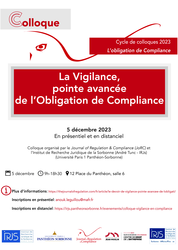
► Référence complète : M.-A. Frison-Roche, M. Mekki et J.-Ch. Roda (dir.), La Vigilance, pointe avancée de l'Obligation de Compliance, Journal of Regulation & Compliance (JoRC), Institut de Recherche Juridique de la Sorbonne (André Tunc - IRJS), Université Paris 1 Panthéon-Sorbonne, 5 décembre 2023.
____
🏗️Ce colloque s'inscrit dans le cycle de colloques organisé par le Journal of Regulation & Compliance (JoRC) et ses Universités partenaires, portant en 2023 sur le thème général de L'Obligation de Compliance.
____
📚Les travaux s'inséreront ensuite dans les ouvrages :
📕L'obligation de Compliance, à paraître dans la collection 📚Régulations & Compliance, coéditée par le Journal of Regulation & Compliance (JoRC) et Dalloz, publié en langue française.
📘Compliance Obligation, à paraître dans la collection 📚Compliance & Regulation, coéditée par le Journal of Regulation & Compliance (JoRC) et Bruylant, publié en langue anglaise.
____
► Présentation générale du colloque : L'Obligation de Vigilance est difficile à cerner à travers la multiplicité des textes et les cas dans lesquels on peut l'appréhender. Cela est particulièrement perceptible à travers le mécanisme de Vigilance qui tout à la fois illustre, voire force le trait, de l'Obligation de Vigilance. A travers les textes internationaux, la loi française et les textes européens adoptés ou en gestation, les contraintes de vigilance, mais aussi les structures et actions mises en place que les entreprises ont organisé ainsi que les actions que les parties prenantes ont engagé, la Vigilance a mis en lumière des aspects de l'Obligation de Compliance, voire a modifié celle-ci.
L'effet de révélation ainsi produit et le mouvement ainsi déclenché, dont les racines sont profondes et les effets systémiques très importants, justifient que l'on cerne davantage des mécanismes qui sont articulés entre eux alors qu'ils sont parfois perçus en silo, ce qui rend difficile la compréhension d'ensemble. De la même façon, parce que la Vigilance est la pointe avancée de l'Obligation de Compliance, l'on peut ainsi mieux distinguer et articuler ce qui relève des spécificités sectorielles, notamment en matière bancaire et financière ou bien en matière numérique, et les articuler avec ce que la Vigilance a, comme la Compliance, de plus général. Plus encore, l'intensité de la Vigilance varie selon les ambitions quelle porte et selon la position de l'entreprise assujettie, ce que traduisent les variations de qualification juridique qui vont du devoir à l'obligation pénalement sanctionnée.
Les différents systèmes juridiques traduisent ces évolutions dans leur loi, leur jurisprudence et la pratique des entreprises et des parties prenantes de façon spécifique car ces différents techniques expriment des normes de comportement et de reddition de comptes dont les exigences probatoires, les conceptions de la responsabilité et les traductions institutionnelles à travers de possibles organes de régulation sont la traduction directe.
En conséquence, le colloque est construit en trois temps. Après une Introduction générale sur les rapports systémiques entre la Vigilance et la Compliance, une première partie porte sur la variation des Intensités de la Vigilance, pointe avancée de la Compliance, une deuxième partie porte sur les Tensions que la Vigilance engendre ou exacerbe, une troisième partie porte sur les Modalités que la Vigilance emprunte dans les systèmes de Compliance.
____

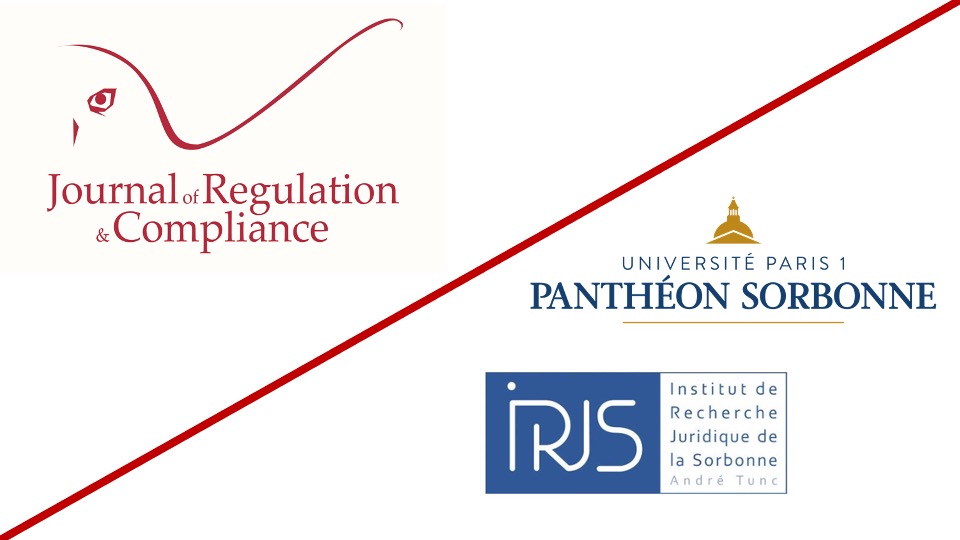
____
► Interviennent :
🎤Laurence Dubin, Professeure à l'Université Paris 1 Panthéon-Sorbonne
🎤Marie-Anne Frison-Roche, Professeure de Droit de la Régulation et de la Compliance, directrice du Journal of Regulation & Compliance (JoRC)
🎤Bernard Haftel, Professeur à l'Université Paris-Nord
🎤Marie Lamoureux, Professeure à Aix-Marseille Université
🎤Grégoire Loiseau, Professeur à l'Université Paris 1 Panthéon-Sorbonne
🎤Véronique Magnier, Professeure à l'Université Paris-Saclay
🎤Gilles J. Martin, Professeur émérite à l'Université Côte d'Azur, membre du Groupe de Recherche en Droit, Économie, Gestion (GREDEG) du CNRS
🎤Mustapha Mekki, Professeur à l'Université Paris 1 Panthéon-Sorbonne
🎤Jean-Christophe Roda, Professeur à l'Université Jean Moulin Lyon 3
🎤Anne-Claire Rouaud, Professeure à l'Université Paris 1 Panthéon-Sorbonne
____
Lire une présentation détaillée de la manifestation ci-dessous⤵️

Dec. 1, 2023
Publications

🌐suivre Marie-Anne Frison-Roche sur LinkedIn
🌐s'abonner à la Newsletter MAFR Regulation, Compliance, Law
____
 ► Référence complète : M.-A. Frison-Roche, Articulation systémique entre Vigilance, Due Diligence, conformité et Compliance, document de travail, novembre 2023.
► Référence complète : M.-A. Frison-Roche, Articulation systémique entre Vigilance, Due Diligence, conformité et Compliance, document de travail, novembre 2023.
____
🎤 Ce document de travail a été élaboré pour servir de base à la conférence introductive au colloque La Vigilance, pointe avancée de l'Obligation de Compliance organisé par le Journal of Regulation & Compliance et l'Université Panthéon-Sorbonne (Paris I) se déroulant le 5 décembre 2023
____
📝Il est aussi la base à l'article constituant l'une des contributions de l'ouvrage L'Obligation de Compliance.
____
► Résumé du document de travail : Le thème général sur lequel de nombreux experts se réunissent pour échanger leurs connaissances et leurs conceptions est celui de La Vigilance, pointe avancée du système de Compliance. Dans la présente étude, il s'agit non pas de traiter le thème à leur place, ni de conclure déjà par anticipation ce qu'il faudrait en penser, mais bien d'introduire un thème, qui tient tout à la fois du très particulier lorsqu'on pense à la loi française du 27 mars 2017 dite Vigilance et du très général lorsqu'on pense à ses finalités qui sont, rien que cela, le sauvetage de la planète et des êtres humains qui y vivent et qui y vivront, finalités qui sont celles du système de Compliance et du Droit de la Compliance qui prend téléologiquement sa normativité dans ses Buts Monumentaux.
Pour introduire les réflexions qui vont venir, il est utile de s'appuyer sur l'hypothèse qui sous-tend l'intitulé même de la manifestation selon laquelle la Vigilance serait la "pointe avancée" de l'Obligation de Compliance". C'est cette hypothèse même qui doit être étayée, contredite, illustrée, "éprouvée", c'est-à-dire "prouvée". Si elle est solide et qu'elle est nuancée par d'autres conceptions qu'elle est apte à accueillir, et qu'on en trouve déjà des illustrations dans les lois, les réglementations, le droit que l'on dit "souple" et les décisions des juges, des autorités de régulation et de supervision
____
🔓lire le document de travail ci-dessous⤵️